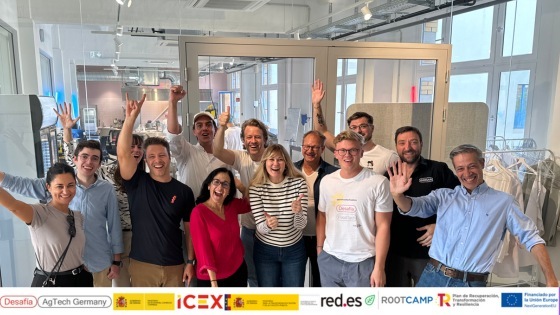With Batch #7, the RootCamp innovation hub from Hannover is starting a new round, welcoming six promising startups into its accelerator program. Over the coming months, the selected teams from Germany, Serbia, Latvia, Belgium, and France will receive targeted support to further develop their technologies, gain access to expertise and investors, and seize the opportunity for pilot projects with industry partners.
The young companies rely on technology-based approaches to address challenges in agriculture, packaging, water and waste management, and CO₂ removal. From software for conducting scientific cultivation trials, to efficient production of microorganisms and plastic-free packaging, to improving the ocean’s capacity as a natural CO₂ sink—the founders demonstrate how ecological sustainability can be combined with economic scalability.
This is RootCamp Batch #7

AgDoIt (Germany) | Digital platform for precise and automated field trials
AgDoIt focuses on a digital platform for automating and standardizing on-farm research. The solution integrates agronomic, machine, and geo-based data to efficiently plan, precisely execute, and scientifically evaluate field trials. Artificial intelligence, sensor technology, and ISOBUS (a cross-manufacturer standard enabling communication between agricultural machinery and software) are used to enable seamless and automated trial execution.
AquaBoostNano (Serbia) | Seed treatment for higher yields under drought conditions
AquaBoostNano develops a nanoparticle-based seed treatment technology that prepares plants for drought stress and reduces yield losses. The solution uses specially developed carbon nanoparticles that activate plants’ physiological stress responses, promote root growth, improve photosynthesis, and strengthen antioxidant defenses. It is environmentally friendly, cost-effective, and fully compatible with existing seed treatments such as coating or pelleting. Across more than 40 laboratory, greenhouse, and field trials with crops like maize and sugar beet, average yield increases between three and eight percent under drought conditions were achieved. The start-up supports seed companies, farms, and growers in boosting the climate resilience of their crops in the long term.
Empyrio (Latvia) | Modular technology for circular economy in wastewater treatment
Empyrio develops compact, energy-positive systems for the thermal treatment of sewage sludge. The goal is a practical solution tailored to small and medium-sized municipal wastewater treatment plants serving around 20,000 to 200,000 people. The patented mono-incineration technology enables autonomous, low-emission sludge treatment directly on site. This process produces phosphorus-rich ash from which phosphorus can be recovered as a valuable nutrient for agriculture. On-site processing can cut transport and disposal costs by up to 50 percent. The modular system can be integrated into existing infrastructure and helps treatment plants comply with upcoming environmental regulations.
Papair (Germany) | New processes for manufacturing sustainable packaging materials
Papair aims to establish paper-based protective packaging as a functional alternative to plastics. Its first product is a paper-based bubble wrap that offers cushioning, is recyclable, and suitable for shipping and transport. The underlying technology enables the production of ecologically sustainable packaging materials with high material efficiency. Papair addresses key challenges in the packaging sector: reducing plastic waste, meeting the demand for resource-efficient solutions, and ensuring the economic scalability of sustainable alternatives.
Pronoe (France) | Water-based solution for CO₂ reduction in the coastal industry
Pronoe develops wastewater treatment systems for industrial plants located near coasts, which enhance the ocean’s natural CO₂ absorption capacity. By carefully adjusting the pH, the alkalinity of seawater is increased, allowing it to absorb more CO₂ from the atmosphere and store it long-term. The systems are installed immediately after industrial processes, improve water quality, mitigate ocean acidification, and enable the issuance of high-quality CO₂ certificates.
Zymofix (Belgium) | Efficient microbe production based on agricultural waste
Zymofix operates a production platform that converts organic waste materials such as manure, digestate, and crop residues into low-cost microbial biostimulants and biocontrol agents. Using a proprietary fermentation process combined with patented pre-treatment, various microorganisms can be efficiently cultivated on residual biomass. Compared to conventional fermentation, Zymofix significantly reduces production costs while improving product shelf life. The fermented substrate can be used directly as a carrier material for applications such as seed treatment or field application.
Whats next at RootCamp?
The teams will receive intensive support over the next three months. Follow us on LinkedIn for the latest updates on their progress. Beyond the accelerator program, RootCamp also organises innovation challenges. One of them is the Water Challenge, run in collaboration with K+S. If you are developing water technology solutions, check out our open call — start-ups, established companies, and research institutions are all welcome to apply.
/rootcamp_logo_white_2022.png?width=2123&height=630&name=rootcamp_logo_white_2022.png)

/RC%20logo%202022.png?width=2325&height=703&name=RC%20logo%202022.png)




